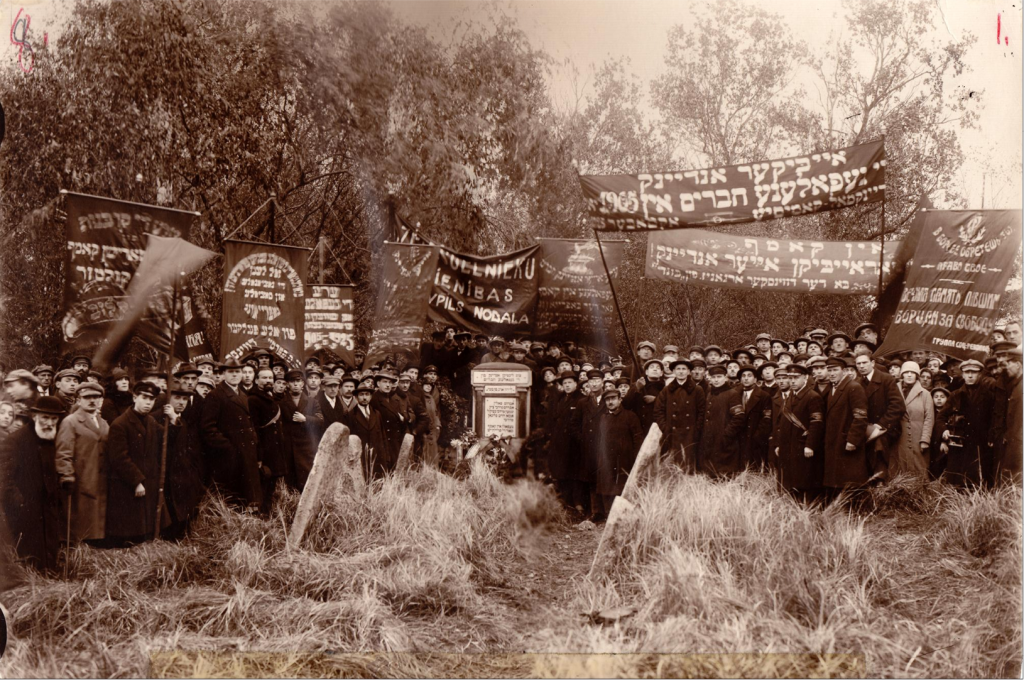| Source (Yiddish) | Translation (English) |
|---|---|
|
ברידער
|
Brothers
|
|
װײסע, ברױנע, שװארצע, געלבע —
מישט די פארבן אױס צוזאמען! אַלע מענטשן זײנען ברידער… פון אײן טאַטן, פון אײן מאַמען! |
White, Brown, Black, Yellow –
mix the colors all together! All people are brothers, From the same father, from the same mother! |
|
אױך — אײן גאָט האָט זײ באַשאַפן,
און — אײן פאָטערלאַנד די װעלט — אלע מענטשן זײנען ברידער, דאָס איז אײנמאָל פעסטגעשטעלט! |
And one God has created them all,
and one homeland: the world – all people are brothers, that is absolutely certain! |
|
* * * |
|
|
אלע מענטשן זײנען ברידער,
שװארצע, װײסע, ברױנע, געלבע… אַנדערש זײנען נאָר די פאַרבן, די נאַטור איז — די זעלבע: |
All people are brothers
Black, White, Brown, Yellow… only the colors are different – but their Nature is the same! |
|
אומעטום דאָס זעלבע פּראַלן,
כ׳האָב עס טױזנט מאָל געהערט! און פון זאָגן ביז צו טראָגן — איז פון הימל ביז צו דר׳ערד! |
Everywhere the same bluster,
I’ve heard it thousands of times! And from talking to bearing (fruit)[1] i.e., from flirting to getting pregnant — It’s (as distant as) heaven to earth! |
|
אלע מענטשן זײנען ברידער:
געלבע, ברױנע, שװאַרצע, װײסע… פעלקער, ראַסן און קלימאַטן — ס׳איז אן אױסגעקלערטע מעשה. |
All human beings are brothers,
Yellow, Brown, Black, White… nations, races, and climates – it’s all an Enlightenment fiction! |
|
אומעטום דער זעלבער מוסר,
אומעטום דאָס זעלבע לײַגן — מיטן מױל דער גאנצער עולם, די פּאָליטיקער מיט שװײַגן! |
|
|
אלע מענטשן זײנען ברידער!
און — זײ שפּילן זיך אין פלישקעס, די נשמות זײנען װערעמלעך — אינעם טאַבעק פון די שישקעס… |
All people are brothers!
And they amuse themselves with frivolities,[4] plishkes, probably from pliszka, although literally referring to wagtail, a kind of bird, is used metaphorically to mean “small thing.” Their souls are (as) little worms – in pinecone snuff[5] lit., in the tobacco of pinecones. The idioms employed here, “a shmek tabek” (a sniff of tobacco) and “shishke” (pine cone), can have the connotation of something worthless. The simile employed here is to emphasize the second line, “they play with frivolous things.” |
The three stanzas of Y.L. Peretz’s “Ale mentshn zaynen brider” left unsung by the Jewish People’s Philharmonic Chorus attest the degree to which Peretz was wielding the poem in a stinging attack of European hypocrisy. Still a popular song thanks to Beethoven’s 9th Symphony, its inclusive universalist principles were being ignored in a late-19th and early-20th century Europe awash with anti-Semitism, racism, and nationalist zeal. In this poem, Peretz is shouting at the hypocrisy of a Europe that sings the Ode to the tune of Beethoven, but neglects its meaning.
I have not been able to learn any more details on when and where exactly Peretz wrote this poem. In 1889, Peretz’s license to practice law was revoked by the Imperial Russian authorities on the basis of suspicion of Polish nationalist feelings. From his article on wikipedia, “Y.L. Peretz rejected cultural universalism, seeing the world as composed of different nations, each with its own character. Liptzin comments that “Every people is seen by him as a chosen people…”; he saw his role as a Jewish writer to express “Jewish ideals…grounded in Jewish tradition and Jewish history….While most Jewish intellectuals were unrestrained in their support of the Russian Revolution of 1905, Peretz’s view was more reserved, focusing more on the pogroms that took place within the Revolution, and concerned that the Revolution’s universalist ideals would leave little space for Jewish non-conformism.”
I have transcribed Y.L. Peretz’s poem from Oysgeṿeylṭe ṿerḳ in tsṿey bender (1951), p.278-279. Many thanks to Dr. Raphael Finkel for his help with translation and interpretation and to Dr. Sabine Arndt with her suggestion. –Aharon Varady
Recordings
Source

Notes
| 1 | i.e., from flirting to getting pregnant |
|---|---|
| 2 | moral, ethic, instruction, rebuke |
| 3 | Thanks to Sabine Arndt for offering this interpretation. |
| 4 | plishkes, probably from pliszka, although literally referring to wagtail, a kind of bird, is used metaphorically to mean “small thing.” |
| 5 | lit., in the tobacco of pinecones. The idioms employed here, “a shmek tabek” (a sniff of tobacco) and “shishke” (pine cone), can have the connotation of something worthless. The simile employed here is to emphasize the second line, “they play with frivolous things.” |



